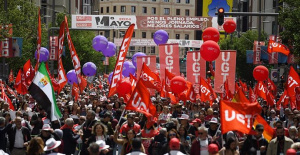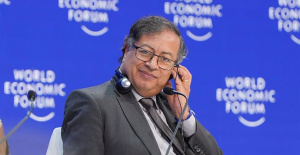He considers that Yolanda Díaz is the only one capable of widening the voter base and not the faces associated with this conflict
MADRID, 27 Nov. (EUROPA PRESS) -
The former first secretary of the Podemos Organization, Sergio Pascual, maintains that not forging enough internal democracy mechanisms at the beginning "bled" the organization, plunging it between 2016 and 2019 into an internal dispute between the likes of Pablo Iglesias and Íñigo Errejón.
What's more, he believes that the conflict that caused his dismissal, as well as the departure of the errejonistas later, hurt the former secretary general more, who was associated with an image of "authoritarian". Meanwhile, in the case of Errejón, he believes that he was wrong to give up, "lower his arms" and not be patient to dispute the leadership of the party openly and form another party (Más País).
This is how he puts it in his book 'A corpse in Congress. From yes you can to no you want', in which he recounts in first person the creation and rise of Podemos, as well as the "internal troubles" between the 'Pablista' and 'errejonista' sectors until his cessation as number 'three' of the party on March 15, 2016.
Pascual concludes that his dismissal opened a "cycle of decline" in the party with the "fracture of two friends" (Iglesias and Errejón), whose visions became "irreconcilable" and with a succession of "purges" that ended up "decapitalizing " to Podemos, which pays "a very high price for uniformity". "We stopped being a welcoming party, to become an inhospitable, cruel party, in which discipline (...) was imposed with blood and fire", he points out.
It also reveals that he commented to Iglesias, before the Vistalegre II congress that visualized the struggle between both factions, that the "cruel way" in which his departure took place was more damaging to the image of the former leader, since that "stigma of ruthless authoritarianism was adhered" to it and "eroded" it through the "excesses of Robespierre" on the part of his supporters.
Meanwhile, Errejón is questioned for choosing to "lower his arms", "keep quiet" in the face of his dismissal and not bet on giving, in the face of internal disputes, "the battle in the open field" making his current official, despite the fact that this implied that they were "summarily" defeated. And he slides that this led Errejón to the "ridiculous" attempt, in a "flight forward", to dispute control of the party but not the general secretary, with the "futile" attempt to try from the "plumbing" to lead Iglesias to their positions.
In addition, he considers that Errejón erred in 2019 by creating Más País and presenting himself to the general elections, assuming that many people would move to that formation, when in reality Podemos had established "bonds of affection and adhesion" that "would not be stripped naked by a mere proclamation of a new ode of transversality".
"The only way that Errejón had to achieve his goal was to wait patiently, either to face Iglesias in a congress, or to wait for his withdrawal," he reflects to conclude that Iglesias always interpreted political dynamics better.
However, he claims that over time he has come to understand the decisions of the two. "It is understandable to be dismissed by a secretary general of a party harassed by the different powers of the State and surrounded by a 'court' that drowned out the debate and drew dissent in the internal discussion and even the hand of enemy agents. It is still understandable , even though I did not agree, that Errejón, in light of the party's undemocratic context (...) gave up, lowered his arms and sought silence and shortcuts so as not to wage the battle of ideas in the open field until It wasn't too late," he sums up.
At the same time, he argues that none of the faces associated with the conflict can broaden the voter base of the space for change and that "only his step aside" to leave a "peripheral" figure in front of that fight, such as the second vice president Yolanda Díaz, could allow once again to recover the space of transversality, by projecting "sensible, solid" and "ideological firmness".
In his book, Pascual locates the summer of 2014 as the beginning of the tensions in Podemos during the course of a meeting in Ávila with the main leaders of the party to outline the strategy for the electoral cycle that would start in 2015, as well as the structure organization for its first citizen assembly.
"The perfect Podemos disappeared before my eyes," describes the former leader to emphasize that in that appointment Iglesias demonstrated the "political animal" and achieved a very presidential formation, associating the success of the brand with his figure. On the contrary, Errejón was betting on a more choral party and being a counterweight as deputy secretary general, something that he did not achieve.
It was also clear that the errejonismo achieved a victory by rejecting the alliance with IU that Iglesias wanted for the 2015 regional elections, but they already sensed that this could cost them "expensive". "The strong leader we projected publicly was in practice. And you don't challenge the leader without consequences," he describes.
In the end, this debate evidenced, in addition to the dispute over internal primacy, the "insurmountable distrust" that began to prevail with a "cold war" and a "catastrophic tie" between both currents that would mark the fracture of Podemos.
"Errejón tried to imitate the intuition, crudeness and coldness of the leadership of Iglesias at the organizational level. He never succeeded," deepens the former number three, who praises the "political lineage" of Iglesias with an ability to anticipate scenarios to gain positions and real power against Errejón, more "essayist" and "blinded" by his hypotheses.
Then, he describes that "sectarianism" and "bullying" were installed in Podemos between 2016 and 2019, where personal relationships and loyalty prevailed over "political rationality". In fact, he displays self-criticism of falling into this dynamic, since politically he coincided a lot with the Church but his affections were with the errejonista family, blinded by this internal dynamic.
"I believe in the rule of law but I was not able to place myself in it with the independence that my position required," he admits, later adding that one of his mistakes was not resigning before his dismissal.
On the other hand, he explains that through a Telegram group the errejonistas showed their discrepancy with the line of the Pabloite sector through a Telegram group and that "clearly offensive" extracts with Iglesias and his trusted people reached the former party leader. And in this regard, he points out that this occurred presumably because the Pabloite sector was able to read that internal chat given that the former Secretary of Organization in Madrid Emilio Delgado on the computer of another colleague (Miguel Vila).
That and the internal conflict in Madrid between both families generated the narrative to the Pabloites, who had another similar group, that an "internal coup d'état" was brewing at the national level and "betrayal" by the "evil errejonistas" who in reality did not exist, but it legitimized the "lightning attack" that led to his dismissal and they did not know how to anticipate
However, he emphasizes that Iglesias informed him on March 15, 2016 of his decision to relieve him "clearly moved" during a meeting. In fact, he emphasizes that both have resumed an affable relationship with the former vice president.

 Exploring Cardano: Inner Workings and Advantages of this Cryptocurrency
Exploring Cardano: Inner Workings and Advantages of this Cryptocurrency Seville.- Economy.- Innova.- STSA inaugurates its new painting and sealing hangar in San Pablo, for 18 million
Seville.- Economy.- Innova.- STSA inaugurates its new painting and sealing hangar in San Pablo, for 18 million Innova.- More than 300 volunteers join the Andalucía Compromiso Digital network in one month to facilitate access to ICT
Innova.- More than 300 volunteers join the Andalucía Compromiso Digital network in one month to facilitate access to ICT Innova.-AMP.- Ayesa acquires 51% of Sadiel, which will create new technological engineering products and expand markets
Innova.-AMP.- Ayesa acquires 51% of Sadiel, which will create new technological engineering products and expand markets UGT and CCOO demand the regeneration of democracy, better salaries and a reduction in working hours
UGT and CCOO demand the regeneration of democracy, better salaries and a reduction in working hours Alcaraz gives up his reign in Madrid against Rublev
Alcaraz gives up his reign in Madrid against Rublev Petro announces that Colombia will break diplomatic relations with Israel
Petro announces that Colombia will break diplomatic relations with Israel The Fed maintains rates and gives the ECB the initiative to reverse monetary restriction
The Fed maintains rates and gives the ECB the initiative to reverse monetary restriction How Blockchain in being used to shape the future
How Blockchain in being used to shape the future Not just BTC and ETH: Here Are Some More Interesting Coins Worth Focusing on
Not just BTC and ETH: Here Are Some More Interesting Coins Worth Focusing on Ivace and promotes a less invasive device for the early detection of prostate cancer
Ivace and promotes a less invasive device for the early detection of prostate cancer Valencia unanimously approves the ordinance to allocate spaces to test innovative initiatives
Valencia unanimously approves the ordinance to allocate spaces to test innovative initiatives UPV researchers promote a paid master's degree as a "talent factory" in integrated photonics
UPV researchers promote a paid master's degree as a "talent factory" in integrated photonics A spin-off of the UV works on obtaining high-resolution 3D biomedical images in real time
A spin-off of the UV works on obtaining high-resolution 3D biomedical images in real time A million people demonstrate in France against Macron's pension reform
A million people demonstrate in France against Macron's pension reform Russia launches several missiles against "critical infrastructure" in the city of Zaporizhia
Russia launches several missiles against "critical infrastructure" in the city of Zaporizhia A "procession" remembers the dead of the Calabria shipwreck as bodies continue to wash up on the shore
A "procession" remembers the dead of the Calabria shipwreck as bodies continue to wash up on the shore Prison sentences handed down for three prominent Hong Kong pro-democracy activists
Prison sentences handed down for three prominent Hong Kong pro-democracy activists ETH continues to leave trading platforms, Ethereum balance on exchanges lowest in 3 years
ETH continues to leave trading platforms, Ethereum balance on exchanges lowest in 3 years Investors invest $450 million in Consensys, Ethereum incubator now valued at $7 billion
Investors invest $450 million in Consensys, Ethereum incubator now valued at $7 billion Alchemy Integrates Ethereum L2 Product Starknet to Enhance Web3 Scalability at a Price 100x Lower Than L1 Fees
Alchemy Integrates Ethereum L2 Product Starknet to Enhance Web3 Scalability at a Price 100x Lower Than L1 Fees Mining Report: Bitcoin's Electricity Consumption Declines by 25% in Q1 2022
Mining Report: Bitcoin's Electricity Consumption Declines by 25% in Q1 2022 Oil-to-Bitcoin Mining Firm Crusoe Energy Systems Raised $505 Million
Oil-to-Bitcoin Mining Firm Crusoe Energy Systems Raised $505 Million Microbt reveals the latest Bitcoin mining rigs -- Machines produce up to 126 TH/s with custom 5nm chip design
Microbt reveals the latest Bitcoin mining rigs -- Machines produce up to 126 TH/s with custom 5nm chip design Bitcoin's Mining Difficulty Hits a Lifetime High, With More Than 90% of BTC Supply Issued
Bitcoin's Mining Difficulty Hits a Lifetime High, With More Than 90% of BTC Supply Issued The Biggest Movers are Near, EOS, and RUNE during Friday's Selloff
The Biggest Movers are Near, EOS, and RUNE during Friday's Selloff Global Markets Spooked by a Hawkish Fed and Covid, Stocks and Crypto Gain After Musk Buys Twitter
Global Markets Spooked by a Hawkish Fed and Covid, Stocks and Crypto Gain After Musk Buys Twitter Bitso to offset carbon emissions from the Trading Platform's ERC20, ETH, and BTC Transactions
Bitso to offset carbon emissions from the Trading Platform's ERC20, ETH, and BTC Transactions Draftkings Announces 2022 College Hoops NFT Selection for March Madness
Draftkings Announces 2022 College Hoops NFT Selection for March Madness



























